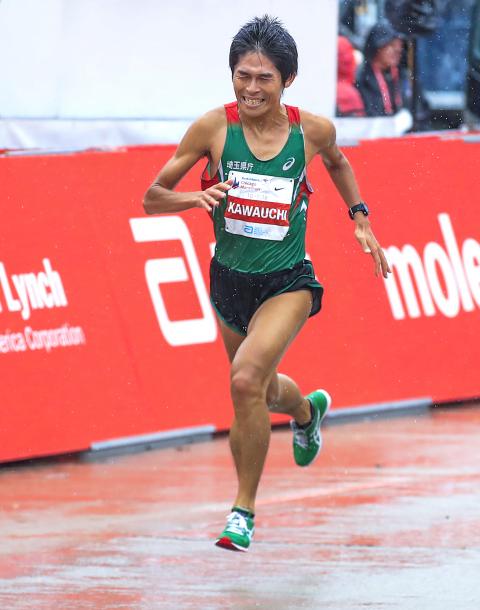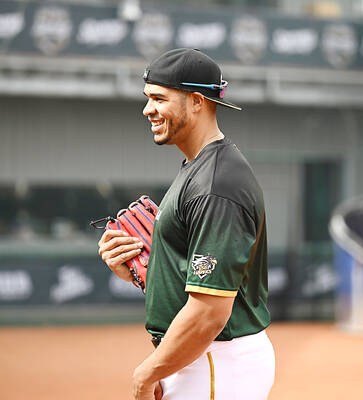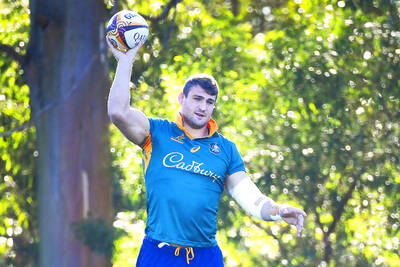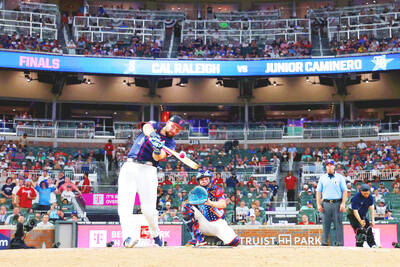In Japan, where more people run marathons than anywhere else, it takes a special character to stand out from the crowd.
In the small town of Kuki, north of Tokyo, one man, Yuki Kawauchi, has done just that, capturing the hearts of marathon fans across the country and abroad.
Unlike other elite marathon runners, Kawauchi, who came to the world’s attention with his Boston Marathon victory last year, is not fully professional and holds down a job as a school administrator.

Photo: EPA-EFE
All this is about to change in April when the 31-year-old, known in Japan as the ‘Citizen Runner,’ will finally look to focus on running full-time.
However, what is not about to change is Kawauchi’s unique take on running preparation.
Kawauchi runs at least 20km every day before or after work, usually through the streets of Kuki, or round and round the running track in the city’s park.
Kawauchi never stops running — he said that he runs around his house when completing chores — and takes part in far more competitive marathons than any of his peers.
While Olympic champion Eliud Kipchoge of Kenya ran just one marathon last year, Kawauchi ran 11. Partly due to the number he has run, the Japanese holds the record for the most sub-2 hour, 20 minute marathons (81).
This also means that he runs more winter marathons than his competitors. His win in Boston, his greatest success to date, came in frigid cold and bitter rain.
The win came down to his preparations, Kawauchi said.
“It is quite rare to run a full marathon in such weather,” he said on a cold, windy day in Kuki.
“Those runners who only join the competition once or twice a year would never experience that kind of weather condition,” he added. “As I have participated in about 80 competitions, I have the experience.”
Kawauchi holds a special place in the hearts of marathon fans across the world for his extraordinary output and unconventional approach.
He won the 2016 Kuki half marathon wearing a suit, and prepares for every race, no matter where he is in the world, with three portions of Japanese curry.
Kawauchi said his decision to run so many marathons comes partly from necessity and partly from a desire to see the world.
“Since I like traveling, it gives me such a pleasant feeling to go all around the world while running,” he explained.
“For me, it is perhaps the only meaning of running,” he said. “I think many of the runners would answer that they run for the Olympics or world championships, but for me, I run just because I want to participate in as many competitions as possible.”
Competing in more marathons also helps Kawauchi stay in shape — to compete in yet more marathons.
“Unlike other runners, I run as an individual runner without belonging to any team and I have my job during the weekdays. This makes it hard for me to keep up the quality of my usual practice,” he added. “In this way, running in the marathon competition is the best practice for me.”
Despite Japan’s love for the marathon, the country last had an Olympic champion in 2004, when Mizuki Nogushi won in Athens.
Kawauchi’s decision to turn professional comes just 15 months before the 2020 Tokyo Olympic Games, but there is no guarantee that he will even try to make the national team.
“I want to take time to think,” said Kawauchi, who has never been selected for the Japanese Olympic team and would be 33 by the time of the 2020 Games.
“I have much more potential or possibility for the Olympics than before, since my time is getting faster,” he said. “But I still don’t know how much I can level up. At this moment, I have not trained enough to compete at the Olympics. It depends on how much I can level up after April.”
Kawauchi’s decision to turn professional came after taking 10 days off work in the build-up to the 2017 World Championships in London.
The added preparation time led to him finishing ninth and he has now set his sights on competing for a podium place at the 2021 World Championships in Eugene, Oregon, after two years of professional training.
Kawauchi would be able to leave his job without any regrets. The school marked its 100th anniversary late last year and Kawauchi had a key role in organizing the celebrations.
“I did not want to have any regrets at the school, that is why I set the time in April this year,” he said. “I got my job done.”

Tainan TSG Hawks slugger Steven Moya, who is leading the CPBL in home runs, has withdrawn from this weekend’s All-Star Game after the unexpected death of his wife. Moya’s wife began feeling severely unwell aboard a plane that landed at Taiwan Taoyuan International Airport on Friday evening. She was rushed to a hospital, but passed away, the Hawks said in a statement yesterday. The franchise is assisting Moya with funeral arrangements and hopes fans who were looking forward to seeing him at the All-Star Game can understand his decision to withdraw. According to Landseed Medical Clinic, whose staff attempted to save Moya’s wife,

Wallabies coach Joe Schmidt yesterday backed Nick Champion de Crespigny to be the team’s “roving scavenger” after handing him a shock debut in the opening Test against the British and Irish Lions Test in Brisbane. Hard man Champion de Crespigny, who spent three seasons at French side Castres before moving to the Western Force this year, is to get his chance tomorrow with first-choice blindside flanker Rob Valetini not fully fit. His elevation is an eye-opener, preferred to Tom Hooper, but Schmidt said he had no doubt about his abilities. “I keep an eye on the Top 14 having coached there many years

ON A KNEE: In the MLB’s equivalent of soccer’s penalty-kicks shoot-out, the game was decided by three batters from each side taking three swings each off coaches Kyle Schwarber was nervous. He had played in Game 7 of the MLB World Series and homered for the US in the World Baseball Classic (WBC), but he had never walked up to the plate in an All-Star Game swing-off. No one had. “That’s kind of like the baseball version of a shoot-out,” Schwarber said after homering on all three of his swings, going down to his left knee on the final one, to overcome a two-homer deficit. That held up when Jonathan Aranda fell short on the American League’s final three swings, giving the National League a 4-3 swing-off win after

Seattle’s Cal Raleigh defeated Tampa Bay’s Junior Caminero 18-15 in Monday’s final to become the first catcher to win the Major League Baseball Home Run Derby. The 28-year-old switch-hitter, who leads MLB with 38 homers this season, won US$1 million by capturing the special event for sluggers at Atlanta’s Truist Park ahead of yesterday’s MLB All-Star Game. “It means the world,” Raleigh said. “I could have hit zero home runs and had just as much fun. I just can’t believe I won. It’s unbelievable.” Raleigh, who advanced from the first round by less than 25mm on a longest homer tiebreaker, had his father